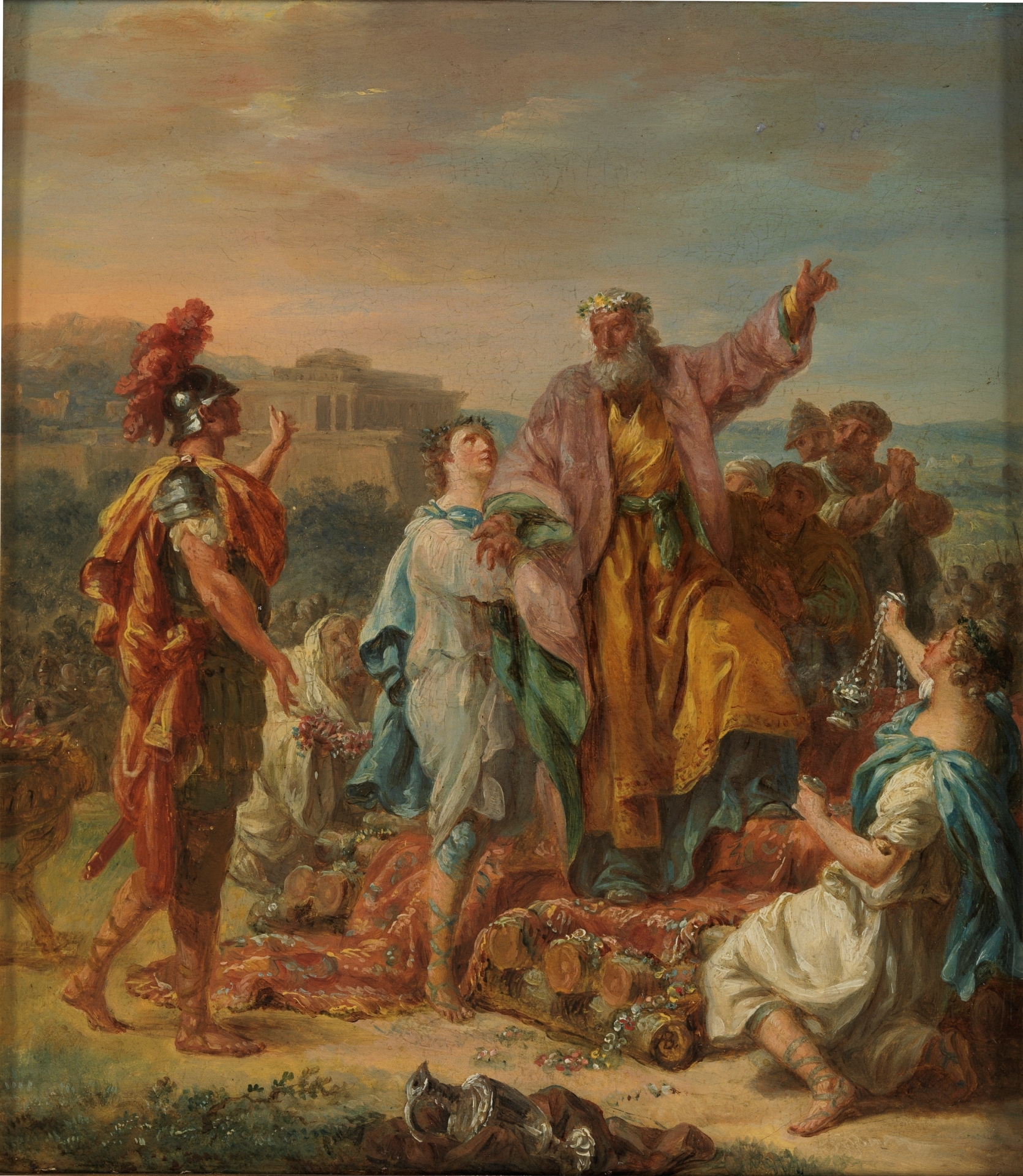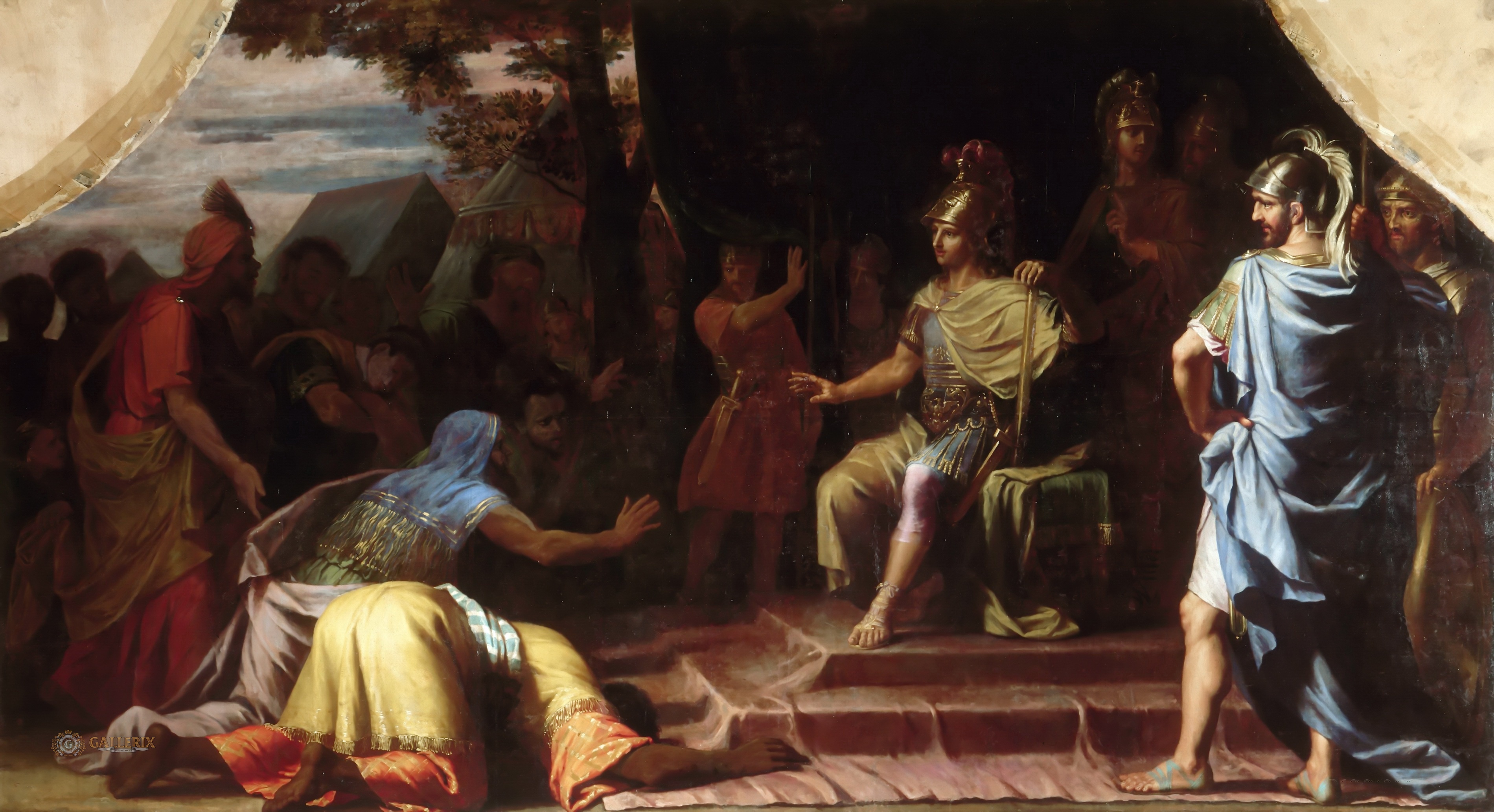Kalanos on:
[Wikipedia]
[Google]
[Amazon]
 Kalanos, also spelled Calanus () ( – 323 BCE), was an ancient Indian gymnosophist and philosopher from
Kalanos, also spelled Calanus () ( – 323 BCE), was an ancient Indian gymnosophist and philosopher from
 He was seventy-three years of age at time of his death. When the Persian weather and arduous travels had weakened him, he informed Alexander that he would prefer to die rather than live as an invalid. He decided to take his life by self-immolation. Although Alexander tried to dissuade him from this course of action, upon Kalanos' insistence the job of building a pyre was entrusted to
He was seventy-three years of age at time of his death. When the Persian weather and arduous travels had weakened him, he informed Alexander that he would prefer to die rather than live as an invalid. He decided to take his life by self-immolation. Although Alexander tried to dissuade him from this course of action, upon Kalanos' insistence the job of building a pyre was entrusted to
 Kalanos, also spelled Calanus () ( – 323 BCE), was an ancient Indian gymnosophist and philosopher from
Kalanos, also spelled Calanus () ( – 323 BCE), was an ancient Indian gymnosophist and philosopher from Taxila
Taxila or Takshashila () is a city in the Pothohar region of Punjab, Pakistan. Located in the Taxila Tehsil of Rawalpindi District, it lies approximately northwest of the Islamabad–Rawalpindi metropolitan area and is just south of the ...
who accompanied Alexander the Great
Alexander III of Macedon (; 20/21 July 356 BC – 10/11 June 323 BC), most commonly known as Alexander the Great, was a king of the Ancient Greece, ancient Greek kingdom of Macedonia (ancient kingdom), Macedon. He succeeded his father Philip ...
and was his teacher. He accompanied Alexander the Great
Alexander III of Macedon (; 20/21 July 356 BC – 10/11 June 323 BC), most commonly known as Alexander the Great, was a king of the Ancient Greece, ancient Greek kingdom of Macedonia (ancient kingdom), Macedon. He succeeded his father Philip ...
to Persis and later self-immolated, after falling ill, entered himself into a pyre, in front of Alexander and his army. Diodorus Siculus
Diodorus Siculus or Diodorus of Sicily (; 1st century BC) was an ancient Greece, ancient Greek historian from Sicily. He is known for writing the monumental Universal history (genre), universal history ''Bibliotheca historica'', in forty ...
called him Caranus ().
According to the Greek sources, he did not flinch as his body burned. He bade goodbye to some of the Greek soldiers who were his students, but not to Alexander. He communicated to Alexander that he would meet him in Babylon and curiously Alexander died exactly a year later in Babylon. It was from Kalanos that Alexander learned of Dandamis, the leader of their group, whom Alexander later went to meet in the forest.
Early life
Plutarch
Plutarch (; , ''Ploútarchos'', ; – 120s) was a Greek Middle Platonist philosopher, historian, biographer, essayist, and priest at the Temple of Apollo (Delphi), Temple of Apollo in Delphi. He is known primarily for his ''Parallel Lives'', ...
indicates that his real name was Sphínēs and that he was from Taxila
Taxila or Takshashila () is a city in the Pothohar region of Punjab, Pakistan. Located in the Taxila Tehsil of Rawalpindi District, it lies approximately northwest of the Islamabad–Rawalpindi metropolitan area and is just south of the ...
, but since he greeted people with the word "Kalē!" – perhaps ''kalya'' ( कल्य) "Greetings" – the Greeks called him Kalanos.
Most sources and scholars refer to Kalanos as a Brahmin
Brahmin (; ) is a ''Varna (Hinduism), varna'' (theoretical social classes) within Hindu society. The other three varnas are the ''Kshatriya'' (rulers and warriors), ''Vaishya'' (traders, merchants, and farmers), and ''Shudra'' (labourers). Th ...
sage, Some scholars have claimed that Kalanos was a Jain, but modern scholarship rejects this notion as Jain ascetics are forbidden from using fire and intentional self-harm due to their convictions about Sallekhana. He was not a Jain monk due to the violent suicide he committed. Further, considering the dominant Brahmanical presence in Taxila, it is likely that the ascetics Alexandar met, including Kalanos, were Brahmanical. Johannes Bronkhorst states that it is highly unlikely that Buddhists and Jains were present in the areas Alexander visited. Furthermore, choosing of death by self immolation among chanting of vedic hymns also cements general opinion that Kalanos was not a Jain or Buddhist but Hindu Brahmin.
Meeting Alexander
Plutarch records that when first invited to meet Alexander, Kalanos "roughly commanded him to strip himself and hear what he said naked, otherwise he would not speak a word to him, though he came fromJupiter
Jupiter is the fifth planet from the Sun and the List of Solar System objects by size, largest in the Solar System. It is a gas giant with a Jupiter mass, mass more than 2.5 times that of all the other planets in the Solar System combined a ...
himself." Kalanos refused the rich gifts offered by Alexander, saying that man's desire cannot be satisfied by such gifts. The gymnosophists believed that even if Alexander killed them "they would be delivered from the body of flesh now afflicted with age and would be translated to a better and purer life."
Alexander's representative Onesicritus had a discussion with several gymnosophists and Alexander was attracted by their thoughts on Greek philosophy, of which they generally approved, but criticized the Greeks for preferring custom to nature and for refusing to give up clothing.
Alexander persuaded Kalanos to accompany him to Persis and stay with him as one of his teachers. Alexander even hinted use of force to take him to his country, to which Kalanos replied philosophically, that "what shall I be worth to you, Alexander, for exhibiting to the Greeks if I am compelled to do what I do not wish to do?" Kalanos lived as a teacher to Alexander and represented "eastern honesty and freedom".
Death and prophecy
 He was seventy-three years of age at time of his death. When the Persian weather and arduous travels had weakened him, he informed Alexander that he would prefer to die rather than live as an invalid. He decided to take his life by self-immolation. Although Alexander tried to dissuade him from this course of action, upon Kalanos' insistence the job of building a pyre was entrusted to
He was seventy-three years of age at time of his death. When the Persian weather and arduous travels had weakened him, he informed Alexander that he would prefer to die rather than live as an invalid. He decided to take his life by self-immolation. Although Alexander tried to dissuade him from this course of action, upon Kalanos' insistence the job of building a pyre was entrusted to Ptolemy
Claudius Ptolemy (; , ; ; – 160s/170s AD) was a Greco-Roman mathematician, astronomer, astrologer, geographer, and music theorist who wrote about a dozen scientific treatises, three of which were important to later Byzantine science, Byzant ...
. Kalanos is mentioned also by Alexander's admirals, Nearchus
Nearchus or Nearchos (; – 300 BC) was one of the Greeks, Greek officers, a navarch, in the army of Alexander the Great. He is known for his celebrated expeditionary voyage starting from the Indus River, through the Persian Gulf and ending at t ...
and Chares of Mytilene. The city where this immolation took place was Susa in the year 323 BC. Kalanos distributed all the costly gifts he got from the king to the people and wore just a garland of flowers and chanted vedic
upright=1.2, The Vedas are ancient Sanskrit texts of Hinduism. Above: A page from the '' Atharvaveda''.
The Vedas ( or ; ), sometimes collectively called the Veda, are a large body of religious texts originating in ancient India. Composed ...
hymns. He presented his horse to one of his Greek pupils named Lysimachus. He did not flinch as he burnt to the astonishment of those who watched. Although Alexander was not personally present at time of his immolation, his last words to Alexander were "We shall meet in Babylon". He is said to have thus prophesied the death of Alexander in Babylon, even though at the time of death of Kalanos, Alexander did not have any plans to go to Babylon
Babylon ( ) was an ancient city located on the lower Euphrates river in southern Mesopotamia, within modern-day Hillah, Iraq, about south of modern-day Baghdad. Babylon functioned as the main cultural and political centre of the Akkadian-s ...
.
A drinking contest was held in response to his death. According to Plutarch
Plutarch (; , ''Ploútarchos'', ; – 120s) was a Greek Middle Platonist philosopher, historian, biographer, essayist, and priest at the Temple of Apollo (Delphi), Temple of Apollo in Delphi. He is known primarily for his ''Parallel Lives'', ...
, citing Chares of Mytilene, Promachus of Macedon drank the equivalent of 13 litres of unmixed wine
Wine is an alcoholic drink made from Fermentation in winemaking, fermented fruit. Yeast in winemaking, Yeast consumes the sugar in the fruit and converts it to ethanol and carbon dioxide, releasing heat in the process. Wine is most often made f ...
and won the first prize of a golden crown worth a talent. He died three days later and forty-one other contestants allegedly died of alcohol poisoning as well.
Legacy
A letter written by Kalanos to Alexander is preserved byPhilo
Philo of Alexandria (; ; ; ), also called , was a Hellenistic Jewish philosopher who lived in Alexandria, in the Roman province of Egypt.
The only event in Philo's life that can be decisively dated is his representation of the Alexandrian J ...
.
A painting by Jean Baptiste de Champaigne depicts "Alexander the Great receiving the news of the death by immolation of the gymnosophist Calanus" is displayed at Chateau de Versailles et de Trianon, Versailles.
See also
* Peregrinus Proteus * ZarmanochegasReferences
{{authority control 390s BC births 323 BC deaths 4th-century BC Indian philosophers Ancient Indian philosophers Rishis Indian spiritual teachers Indo-Greek religions and philosophy Philosophers and tutors of Alexander the Great Prophets Suicides by self-immolation in India 4th-century BC monks Ancient suicides Taxila Tehsil Suicides by self-immolation